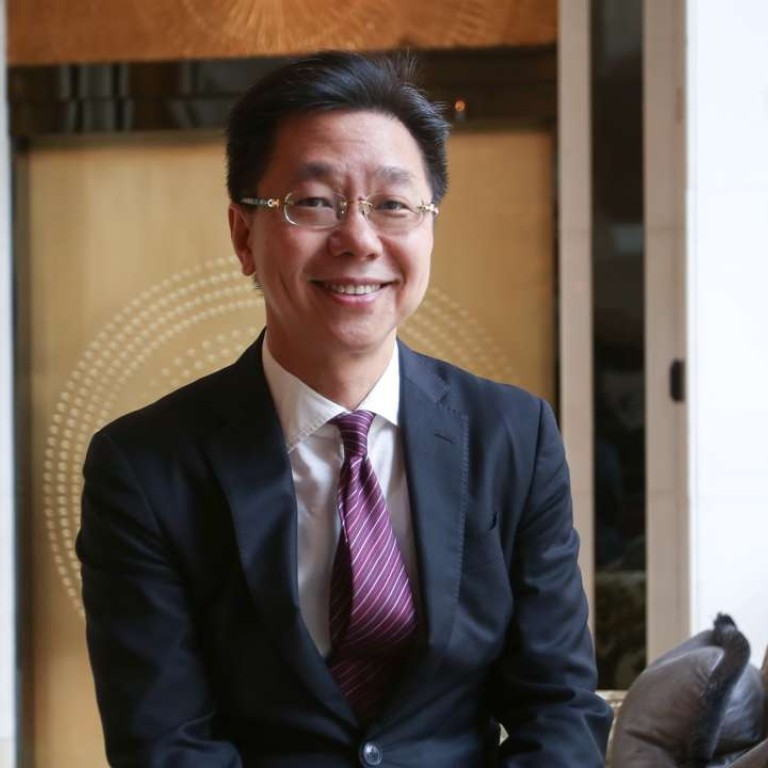
Hong Kong’s land prices likely to continue on upward trend, JLL’s Lau Chun-kong says
JLL’s Lau Chun-kong shares his thoughts on why developers are price cutting as they bid for land at record rates, what can be done to ease land supply and what the future holds for the Wang Chau development scheme in Yuen Long
Lau Chun-kong, head of valuation advisory services and international director of JLL,
has more than 29 years of property experience in Hong Kong, China and the Asian region.
Lau has a wide breath of experience in valuation, real estate consultancy and investment sales.
He also has a number of different roles among community and professional bodies. He is the president of the Hong Kong Institute of Surveyors (HKIS), a chairman of the licensing committee at Estate Agents Authority, and a member of the Land and Development Advisory Committee.
The Land Development Advisory Committee, which was announced by the government in June 2015 to tasked to help advise the administration on planning policy and development.
While developers, in general, are launching new projects at a price less aggressive than what they were last year, they are paying high prices for government sites. Why is this?
Launching projects and buying land are two separate issues. Developers have to price their new projects according to the market conditions. But buying land is different. Bids are based on their projections of the market outlook as property development requires a three or four year period before pre-sales can take place.
Therefore, the rise in land prices can also be interpreted as developers’ optimism towards the residential market outlook as they believe they can sell for higher prices in future.
Will land cost continue to rise?
Yes. Developers have raised their bids when it comes to land acquisitions at government tender. In addition, Hong Kong developers’ land banks are relatively small. We noticed that projects currently put on sale were built on sites being sold three years ago during the term of Chief Executive Leung Chun-yin.
What should the government do to ease the land supply?
Hong Kong is not only short of land for housing but office, retail and logistics usage.
For the past decade, we did not see any “new town development” similar to Sha Tin or Tseung Kwan O being created.
Building up a new town will require huge investment as money needs to spent on compensation for land resumption to affected residents; infrastructure development such as roads, schools, hospitals, sewage system and utilities.
For instance, the proposed Northeast New Territories development could incur HK$120 billion in investment. [Editor’s note: The proposal will provide about 60,000 units, of which 60 per cent will be public housing and the remainder allocated to private flats.] The government has generated land sale revenue of about HK$70 billion to HK$80 billion annually, or even up to HK$100 billion. It means it has saved nearly HK$700 billion in the past 10 years by not setting up any new town.
Despite mounting opposition among villagers and other pressure groups against development in the New Territories, the government has no choice. Providing more housing supply is the only way to upgrade our living standards.
What’s your view on the controversial 33 hectares Wang Chau development scheme in Yuen Long?
The Wang Chau development scheme has attracted various accusations, including allegations of collusion between the government, business, landlords and triads.
The creation of development land has proved to be extremely difficult even though the current government has committed to providing land supply to meet long-term housing targets, both private and public.
The government put priority or the so-called easy part of the 5.6 hectare public housing site and related development. It will take 13 years from commencement of planning study in 2012 up to completion of housing blocks in 2025, according to the government documents.
The process involves rezoning from green belt land to private land and the relocation of many existing occupiers living in squatter and temporary structures, which is expected to be difficult. It also involves site formation and infrastructure development, and the construction of the housing blocks. The 27.4 hectares, or the difficult part, will involve rezoning of land which has been actively used for open storage and zoned as such.
Relocation of the existing occupiers is an issue which the government has taken into consideration, in addition to other constraints like infrastructure development. The growth of Hong Kong relies upon the provision of sufficient land resources and the government needs to have the courage and strength to tackle the many challenges.
Hundreds of thousands of land leases are set to expire in 2047. Will HKIS convey the public concern and ask the government to release more details on lease renewal?
The government has stated clearly that leases, except those for special purposes such as chemical plants, will be extended for another 50 years with 3 per cent of ratable value set as annual government rent.
But we hope the government will release more details on the lease renewal. For instance, providing sufficient time for owners, like more than two years, to examine their flats to ensure no illegal structures and comply with safety standard before renewing the lease.

